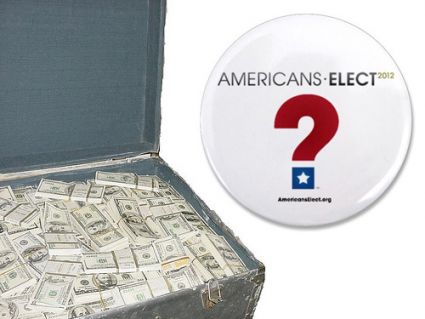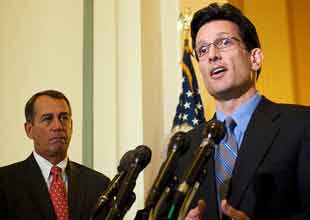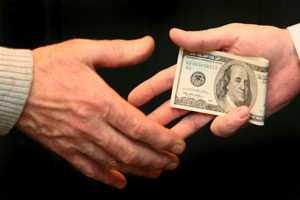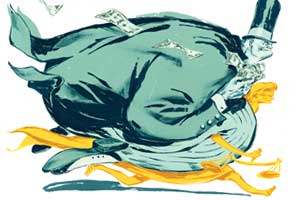
<a href="http://www.flickr.com/photos/coda/2740581315/in/photostream/">Damien de Toit</a>/Flickr; <a href="http://www.cafepress.com/americanselect.557749358">Americans Elect</a>/Cafe Press
An upstart political reform group called Americans Elect is looking to blow apart the Democrat-Republican duopoly that dominates American politics. Its imaginative scheme: nominating an independent presidential candidate over the internet. The group is on the ballot in a half-dozen states, and the national buzz surrounding its initiative is growing—but so too are the questions about who’s bankrolling this effort and the security of the outfit’s voting procedures.
Americans Elect rose from the ashes of Unity08, a group formed in 2006 to increase access to the electoral system for independent presidential candidates. Via Americans Elect’s website, registered voters can sign up as “delegates” and nominate “any American [they] believe can be a great leader.” (For reference, the site offers a lengthy list of current political figures.) In April, delegates will winnow the field of candidates to six finalists, each of whom will then select a running mate from another party (if a finalist decides not to run, he or she can decline). And in June, Americans Elect plans to hold an online convention to decide which candidate will appear on the Americans Elect ballot line.
To become certified as a political party, the group must first collect a certain number of signatures in each state. All told, Americans Elect plans to spend $10 million on this effort. So far the group has been certified in six states, including key swing states Florida and Michigan. Certification is pending in California. That’s an encouraging sign for a group hoping to starting an electoral revolution.
But campaign watchdogs are sounding the alarm about the group’s lack on transparency. In late 2010, Americans Elect changed its tax status from a tax-exempt 527 group to a 501(c)(4), or social-welfare organization—the same classification as Crossroads GPS and other dark money outfits. Under tax law, such groups are not permitted to make political advocacy the majority of their activity. Unlike 527 groups, which must publicly disclose its donors, 501(c)(4)s are under no such obligations.
In September, campaign finance watchdogs Democracy 21 and the Campaign Legal Center requested that the IRS investigate whether Americans Elect and several other 501(c)(4)s qualify for tax-exempt status. Fred Wertheimer, president of Democracy 21, says that Americans Elect is functioning like a political party, making it ineligible for tax exemption. “A political party cannot be a social-welfare organization under our tax laws,” Wertheimer says. “The danger to the integrity of the electoral system is the failure to disclose their donors, which is essential information in our political process.”
Dan Winslow, Americans Elect’s chief legal counsel, says the recent furor over dark-money groups “has been directed towards 501(c)(4)s that are actually [political] advocacy organizations, advancing the interests of an identifiable candidate or group of candidates.” But because Americans Elect focuses on reforming the election system and not on political advocacy, Winslow argues that it shouldn’t be lumped in with the others.
Americans Elect officials say they need secret contributions in order to upend a sclerotic system. “We have to be able to raise significant amounts of money to be able to take on the status quo,” says Kahlil Byrd, Americans Elect’s chief executive officer. Were the group compelled to disclose its donors, he says, there would be “a chilling effect…on people’s willingness to participate in this process.” That is, increased disclosure would dissuade potential big donors. (Before the group switched its tax status, the group received $1.55 million from its chairman, former financier Peter Ackerman, whose son, Elliot, is the group’s COO.)
Americans Elect officials also have refused to disclose details about individual state spending. “We don’t talk about specific budget numbers in each state,” says Byrd, a former spokesperson for Massachusetts Govs. Mitt Romney and Deval Patrick. “What we will say is that it is an expensive proposition.”
The source of Americans Elect’s money is not the only cause for concern. Pamela Smith, president of VerifiedVoting.org, a voters’ advocacy group, questions the group’s reliance on internet voting. Smith and other election experts argue that it is insecure and exceedingly difficult to audit.
Kahlil Byrd and Dan Winslow agree that internet voting is not a reliable tool for general or primary elections. But they insist that what Americans Elect is doing is “very different,” and that the voting in the online convention will be audited. By who? Americans Elect is “in the early stages of those conversations,” Byrd says.
Based on what Americans Elect officials have told her in a series of conversations, Smith remains unconvinced that they have brought on the right people and the right technology to implement a transparent, easily audited internet voting system. “If you allow it to be used in public elections without assurance that the results are verifiably accurate, that is an extraordinary and unnecessary risk to democracy,” she says.
But Americans Elect’s national profile continues to grow. According to its website, it has already collected over 2 million signatures nationwide in its effort to get on state ballots, and drawn suggestions from over 6.5 million people to help draw up a party platform—all this, even as concerns about its dark money and voting system continue to mount.
“They say…its time to stop playing by the old rules,” Fred Wertheimer says. “But these are the old rules that they’re trying to play by.”












